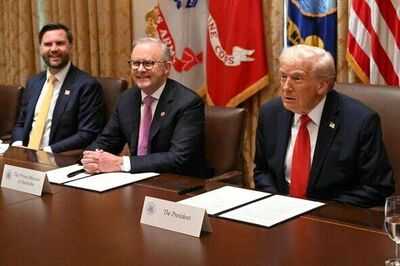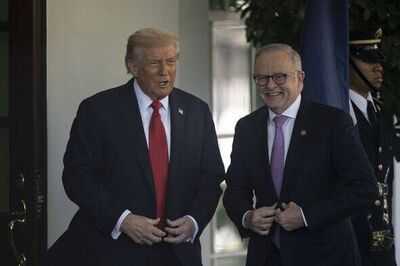
Donald Trump has provided a fresh update on the multi-billion dollar submarine deal between the US, UK and Australia following his meeting with Prime Minister Anthony Albanese at the White House on Monday to sign a critical minerals agreement.
The encounter marked the first bilateral summit between the two leaders, who had previously met briefly last month during the United Nations General Assembly.
The pair have also held approximately four telephone conversations.
Trump shared progress on the Aukus security pact, Australia's largest ever defence project, which is being overseen by the principal adviser to the U.S. defence secretary, Elbridge Colby.
"The submarines that we're building for Australia are starting to really move along," he said, reports the Express US.
"The process is getting very exciting, isn't it?"
Secretary of the Navy John Phelan described the military partnership between the U.S. and Australia as crucial, particularly for America's capability "to project power in the Indo-Pacific."
Phelan revealed that efforts are currently underway to enhance Aukus and "clarify ambiguity" within the agreement.
"We're looking at the Aukus relationship and making it better for all three," he said.
Whilst addressing reporters, Trump confirmed the U.S. is working on constructing additional submarines for Australia, noting that the process would be accelerated.

Under the Aukus deal, Australia's navy will be equipped with a fleet of nuclear-powered submarines, including three American-made Virginia-class vessels. Trump was questioned about trade relations with China, which recently tightened its export restrictions on 9 October.
"I think we're going to reach an agreement that's good for both countries," the president declared.
When probed about whether the Aukus pact would deter China, Trump affirmed it would, but added, "I don't think we're going to need it" with China. "We're going to get along with China."
China controls a majority of rare earth metals, of which the U.S. is a significant consumer, sourcing approximately 70% of its rare-earth compounds and metal imports from China between 2020 and 2023.
Australia also possesses several critical minerals such as lithium and copper - essential for modern technology from smartphones to electric cars, yet China still maintains dominance over the global supply chain.
"Australians love America, and I think Americans kind of like Australia too," Albanese stated. "As we go forward, I think today will be seen as a really significant day in our relationship."
The U.S. is Australia's second-largest trading partner and has enjoyed a substantial surplus, bringing in $281 billion since the Australia-U.S. Free Trade Agreement was enacted in 2005.
In return, Australia has managed to avoid the worst of Trump's tariffs, only given a baseline rate of 10%, the lowest rate of any country.
You may also like

CM Yogi links Halal-certified products to terror funding, claims Rs 25K crore raised

Attacks on doctors not acceptable in civilised society: Bengal Governor

Dehradun horror: Woman dies after doctors leave bandage inside body during childbirth; 4-member panel set up

Pakistan's dangerous game: Wooing Trump at the cost of China (IANS Analysis)

Declan Rice suspension fear grows for Arsenal after new Champions League ban







